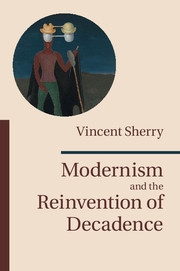Book contents
- Frontmatter
- Dedication
- Contents
- Acknowledgments
- Introduction The Codes of Decadence: Modernism and Its Discontents
- Chapter I The Time of Decadence
- Inter-chapter The Cultivation of Decay and the Prerogatives of Modernism
- Chapter II The Demonstrable Decadence of Modernist Novels
- Inter-chapter Imagism
- Chapter III Ezra Pound: 1906–1920
- Inter-Chapter Reforming Decadence: Late Romanticism, Modernism, and the Politics of Literary History
- Chapter IV T. S. Eliot: 1910–1922
- Afterword Barnes and Beckett, Petropi of the Twilight
- Notes
- Index
Introduction - The Codes of Decadence: Modernism and Its Discontents
Published online by Cambridge University Press: 05 October 2014
- Frontmatter
- Dedication
- Contents
- Acknowledgments
- Introduction The Codes of Decadence: Modernism and Its Discontents
- Chapter I The Time of Decadence
- Inter-chapter The Cultivation of Decay and the Prerogatives of Modernism
- Chapter II The Demonstrable Decadence of Modernist Novels
- Inter-chapter Imagism
- Chapter III Ezra Pound: 1906–1920
- Inter-Chapter Reforming Decadence: Late Romanticism, Modernism, and the Politics of Literary History
- Chapter IV T. S. Eliot: 1910–1922
- Afterword Barnes and Beckett, Petropi of the Twilight
- Notes
- Index
Summary
On the first of January 1914, for the first number of The Egoist, which is arguably the first journal of a nascent literary modernism in England, Ezra Pound takes up the theme of firstness in introducing his group to London literary society. He is presenting these modernists of the 1910s, however, to a readership that still holds the memory of a preceding generation, the so-called decade of decadence, the 1890s. The rhetorical energy of the piece goes to differences. The oppositions are forcefully drawn:
“A generation came down to London resolved to speak as they wrote.” For all that disastrous decade men spoke with the balanced sentence. There was great awe in the world.
And then there came to London a generation that tries to write as it speaks – and these young men are termed petulant – a praise by faint condemnation?
The difference Pound is claiming is a truism of literary history now. He is emphasizing the poetics of vital voice in his own decade against the artifice of written literature among Nineties poets. Those were writers, following the conceit that Max Beerbohm used to describe the style of Walter Pater, who are supposed to have wrapped their every sentence in a shroud; they interred their words in the stylized ritual of their written English. That was a manner characterized by Latinate syntax and vocabulary, not by idiomatic directness. Pound’s assertion of his poets’ difference from the writerly Nineties, however, comes through a fragment of syntactical parallelism – “a generation came down to London,” “there came to London a generation” – that adapts the grammar of the generation who “spoke with the balanced sentence.” Is this a heckling echo? Or involuntary homage? Or both?
- Type
- Chapter
- Information
- Modernism and the Reinvention of Decadence , pp. 1 - 36Publisher: Cambridge University PressPrint publication year: 2014



